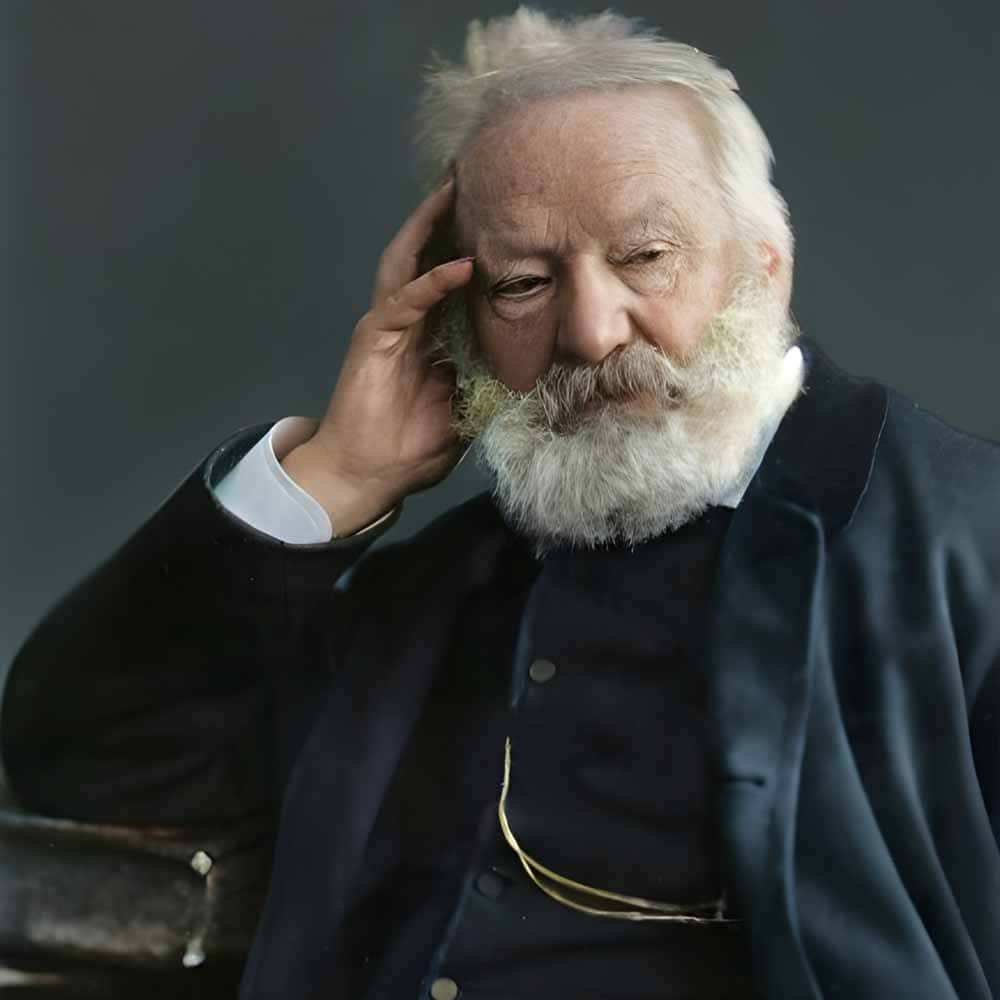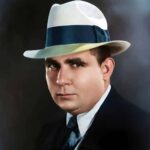
Victor Hugo: The Enduring Legacy of a Literary Titan
Victor Hugo is among the most towering figures in French literature, renowned for his profound influence on both the Romantic movement and genres beyond. Born on February 26, 1802, in Besançon, France, he rose to become an influential writer, playwright, poet, and statesman. His works traverse the span of his tumultuous life, reflecting his political views, his personal struggles, and the social issues of his time.
Notable for his eloquence and command of the language, Hugo’s novels, such as “Les Misérables” and “The Hunchback of Notre-Dame,” have become classics, illustrating the depths of human experience and emotion. His ability to depict complex characters and weave detailed settings has secured his status as a master storyteller whose narratives resonate with audiences around the world.
Beyond his literary contributions, Victor Hugo was an avid campaigner for social causes, particularly the abolition of the death penalty. His political activities led to periods of exile, during which he continued to write prolifically. As a cultural icon, Hugo has left an indelible mark not only in literature but also in the realms of social and political thought.
1. Early Life and Background
Victor Hugo was born in Besançon on February 26, 1802. His early life was shaped by a complex family dynamic and his exposure to the literary world through his mother, Sophie Trébuchet.
1.1. Youth in Besançon
Victor Hugo’s childhood was spent under the care of his mother after his parents’ separation. Sophie Trébuchet influenced young Victor with her royalist political leanings, contrasting with his father, Joseph Léopold Sigisbert Hugo, a general who supported Napoleon. The family moved frequently due to his father’s military postings, shaping Victor’s early experiences and perspectives.
1.2. Education and Formation
Hugo’s formal education commenced in Paris, where he began to cultivate his literary skills. As a poet and writer, his formation was partly self-taught and partly formal. He frequented literary salons and was exposed to the influential figures of the time, allowing him to establish connections that would benefit his future career in literature. The tragic loss of his daughter Léopoldine Hugo in 1843 deeply affected him and influenced his subsequent work.
2. Literary Career
Victor Hugo’s literary career spans across various genres, including pivotal contributions to novels, poetry, and plays. He is celebrated for infusing the romanticism movement into his works and leaving a lasting impact on literature.
2.1. Pivotal Works
- Les Misérables: Often regarded as Hugo’s magnum opus, this novel details the struggles within French society and introduces iconic characters like Jean Valjean.
- The Hunchback of Notre-Dame (Notre-Dame de Paris): This book not only popularized Gothic fiction but also led to a renewed interest in preserving the historical Notre-Dame Cathedral in Paris.
2.2. Romanticism and Influence
- Cromwell: Illustrated the dramatic manifesto of the romantic literary movement.
- Hernani: Sparked the “Battle of Hernani,” which was crucial in establishing romanticism in French literature and theater.
2.3. Poetry and Novels
- Poetry: Collections like Les Contemplations reflect profound lyricism and an exploration of themes like nature, love, and death.
- Fiction: Hugo’s novels often navigated social issues and human rights, intertwining his political views within gripping fictional narratives.
Victor Hugo’s career as a novelist and dramatist showcases a vast array of literary creations that continue to resonate with readers and scholars alike. His mastery of language and storytelling places him among the seminal figures of 19th-century literature.
3. Political Involvement and Exile
Victor Hugo’s journey through the tumultuous political landscape of 19th-century France led him from fervent activism to a period of exile that profoundly influenced his works. This section explores his political engagements and the circumstances that forced him to live outside his homeland.
3.1. Activism and Coup
Victor Hugo initially supported Louis XVIII and the constitutional monarchy but gradually shifted towards republican ideals. Hugo’s political leaning underwent a substantial transformation from royalist to republican, especially manifested in the Revolution of 1848 when he actively supported the establishment of the Second Republic. Later, he won a seat in the National Assembly, where he voiced opposition to social injustices and the death penalty.
His critical turning point came with the coup by Louis-Napoleon Bonaparte, later known as Napoleon III, on December 2, 1851. Hugo openly denounced the coup, which effectively dissolved the Second Republic. Despite his efforts to organize resistance, his activism ultimately led to his need to flee France.
3.2. Life in Exile
The consequences of Hugo’s political activism culminated in his exile spanning nearly two decades, primarily on the islands of Jersey and Guernsey. Hugo’s exile began in 1851, after Napoleon III seized power, and it lasted until 1870 when the Third Republic was proclaimed following Napoleon III’s downfall.
| Location | Period |
|---|---|
| Jersey | 1852-1855 |
| Guernsey | 1855-1870 |
During these years, Hugo continued his literary work, producing some of his most renowned novels such as “Les Misérables.” The experience of exile enriched his writing, embedding a clear revulsion for tyranny and a fortification of his republican ideals. His letters and poems from this time, notably “Les Châtiments,” are scathing critiques of Napoleon III’s regime. Hugo’s life in exile not only molded his political views but also cemented his legacy as a writer committed to justice and human rights.
4. Victor Hugo Personal Life and Relationships
Victor Hugo’s personal life was marked by profound connections and complex relationships that played significant roles in his life and work. His devotion to his family coexisted with his passionate and often public romantic entanglements.
4.1. Family and Marriage
Victor Hugo married Adèle Foucher in 1822, with whom he had five children. Their marriage endured despite Hugo’s infidelities and the tragic death of their daughter, Léopoldine Hugo, who drowned in 1843. This event profoundly affected Hugo, leading to a solemn and introspective period in his literary works.
4.2. Affairs and Correspondence
Hugo engaged in several high-profile affairs, most notably with Juliette Drouet, an actress who left her career to dedicate herself to him. She became his lifelong companion and confidante, and their relationship is evidenced through copious correspondence, stretching over 50 years. Despite his affairs, Hugo maintained a relationship with his wife Adèle until her death. His mother, Sophie Trébuchet, had passed away before he gained major recognition, influencing his earlier life and works.
5. Legacy and Impact
Victor Hugo’s death was a moment of national significance, leading to collective mourning and a reflection on his profound impact on culture and society. He continues to be celebrated for his ambitious works that touched upon themes of justice, freedom, and the human condition.
5.1. Death and National Mourning
Victor Hugo passed away on May 22, 1885. His passing prompted an outpouring of national grief unprecedented for a writer. He was accorded the rare honor of lying in state under the Arc de Triomphe, where millions paid their respects. Hugo’s final resting place is the Panthéon in Paris, a mausoleum containing the remains of distinguished French citizens, a testament to his status as a national hero.
- Date of Death: May 22, 1885
- Place of Honoring: Arc de Triomphe
- Final Resting Place: Panthéon
5.2. Cultural and Artistic Influence
Victor Hugo made enduring contributions to literature and the arts, influencing generations of writers, artists, and thinkers. His works tackled themes of injustice and poverty, resonating with many and inspiring movements for social change.
- Major Themes: Justice, Freedom, Injustice, Poverty
- Biography: Insight into his mind and era
- Artistic Influence: Including but not limited to literature, painting, music, and theater
His novels, particularly “Les Misérables” and “The Hunchback of Notre-Dame,” have inspired countless adaptations in film, theater, and music, reflecting their deep cultural impact. Hugo’s advocacy for social causes has immortalized him as a symbol of the quest for justice and freedom.
6. Major Themes in Hugo’s Work
Victor Hugo’s work is renowned for its profound exploration of social justice and humanity, as well as a deep engagement with religion and spirituality. His literature consistently reflects upon the human condition, often highlighting the interplay between societal structures and personal morality.
6.1. Social Justice and Humanity
Victor Hugo passionately addresses the nuances of social justice in his literature, underscoring the struggles against injustice and championing the cause of the downtrodden. In works like Les Misérables, Hugo depicts misery as not just a personal affliction, but as a societal failing, where the poor and disenfranchised are often ignored or punished. Through characters that act as angels amidst the desperation, he explores the potential for goodness and compassion:
- Jean Valjean: Represents the capacity for transformation and embodies the pursuit of justice in a society rife with injustice.
- Javert: Embodies the rigid application of the law, often in conflict with the moral imperative of mercy.
Through these and other characters, Hugo argues for a version of humanity that prioritizes soul and compassion over rigid societal rules.
6.2. Religion and Spirituality
Hugo’s exploration of religion and spirituality does not conform strictly to institutionalized beliefs but often presents a more personal and intrinsic approach to understanding the divine. In his writings:
- God is shown as a pivotal figure, often shaping characters’ moral compasses and influencing their decisions.
- The struggle between faith and reason is a recurring theme, where characters grapple with spiritual crises and existential questions.
Hugo’s works encourage readers to reflect inward and question the nature of the soul, thereby encouraging a form of spirituality that connects deeply with the concepts of justice and humanity.




